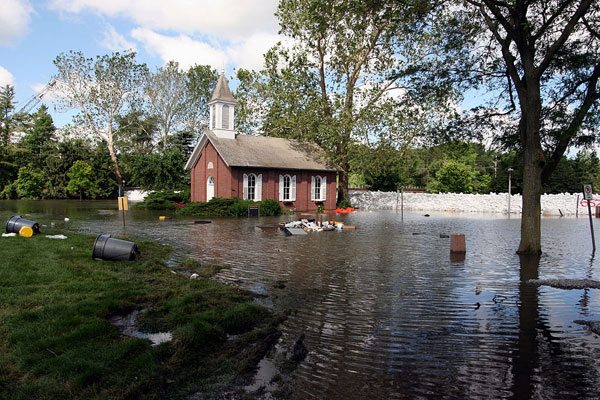
January 4, 2018; Politico and Washington Post
The Federal Emergency Management Agency has released new funding rules that will allow direct funding to houses of worship damaged during national disasters. The shift has been hailed by some church leaders as bringing fairness to a system that already allowed direct funding to other nonprofits, while church-state separation advocacy groups call the change a violation of the First Amendment.
In addition to assistance provided to public agencies, local governments, and individuals, FEMA provides grant funding to eligible nonprofits. The document laying out the new rules states that FEMA will not “exclude houses of worship from eligibility for FEMA aid on the basis of the religious character or primarily religious use of the facility.” FEMA now lists the “activities of community centers or houses or worship open to the general public” as services whose restoration may be funded.
The revised policy will be retroactive to cover damage incurred as early as August 23, 2017, providing relief to churches damaged by Hurricanes Harvey and Irma.
The change in policy comes after a number of lawsuits by churches in Florida and Texas seeking access to relief funding. NPQ reported in September that three Texas churches had filed a lawsuit, citing the precedent of a Supreme Court case out of Missouri in which a church preschool won access to state funds for playground resurfacing. That ruling, handed down in June, declared that Trinity Lutheran should not be “excluded from a public benefit for which it is otherwise qualified” solely due to its status as a church. However, a judge ruled last month that the precedent set by the Missouri case did not require FEMA to pay the three Texan churches to repair structures used primarily for religious purposes. The churches have appealed the ruling.
Sign up for our free newsletters
Subscribe to NPQ's newsletters to have our top stories delivered directly to your inbox.
By signing up, you agree to our privacy policy and terms of use, and to receive messages from NPQ and our partners.
During the launch of the lawsuit, President Donald Trump tweeted that churches should be entitled to funds for assisting victims of Hurricane Harvey.
FEMA Recovery Directorate Assistant Administrator Alex Amparo cited the Missouri case in the agency’s new policy document, stating, “In light of the Trinity Lutheran decision, FEMA has considered its guidance on private nonprofit facility eligibility and determined that it will revise its interpretation of the aforementioned statutory and regulatory authorities so as not to exclude houses of worship from eligibility for FEMA aid on the basis of the religious character or primarily religious use of the facility.”
During the Katrina disaster, George W. Bush’s administration changed the rules to allow certain religious institutions to receive funding. In 2005, FEMA paid for the rebuilding of parochial schools, religious community centers and religious hospitals and nursing homes, but not houses of worship. The White House Office of Faith-Based and Neighborhood Partnerships had been established by the Bush administration in 2001, but was not intended to support worship activities.
The new policy announced Tuesday will likely see resistance from groups such as Americans United for Separation of Church and State, the American Civil Liberties Union, and the Anti-Defamation League. At the time of the Texas lawsuit, these groups filed an amicus brief with Texas’s fifth district court, declaring, “Far from compelling FEMA to provide grants to repair places of worship, the Constitution prohibits it from doing so.”—Lauren Karch













